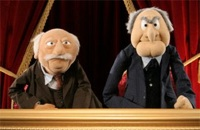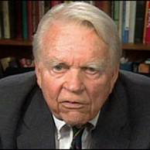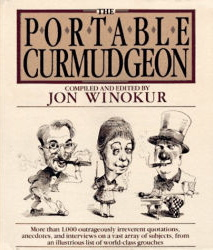 In response to one of my recent blog posts, a friend suggested that I was becoming a curmudgeon. I wasn’t really sure whether I should feel insulted by the comment. I decided to look the word up in the dictionary.
In response to one of my recent blog posts, a friend suggested that I was becoming a curmudgeon. I wasn’t really sure whether I should feel insulted by the comment. I decided to look the word up in the dictionary.
According to the Miriam–Webster Dictionary, a curmudgeon is “a crusty, ill-tempered, and usually old man.” Wiktionary, the free dictionary on the internet, enhances the definition by adding the concept that the curmudgeon is “… full of stubborn ideas or opinions.” (I find it fascinating that curmudgeons are always male. As I pondered this point, I found it difficult, nay, impossible, to come up with a single example of a female curmudgeon.) The word has been with us for quite a while. While its origin is unknown, its first known use was in the late 16th century.
To get a better sense of what it may mean to be a curmudgeon, I explored its synonyms.  Curmudgeons are said to be bellyachers, complainers, crabs, cranks and sourpusses. Curmudgeons grouch, fuss, gripe, growl, grumble, murmur, mutter and whine.
Curmudgeons are said to be bellyachers, complainers, crabs, cranks and sourpusses. Curmudgeons grouch, fuss, gripe, growl, grumble, murmur, mutter and whine.
It’s not a pretty picture that the dictionary paints. Curmudgeons, at least of the type matching the dictionary definition, are certainly not people you’d want to invite to a dinner party.
Historically, though, the true curmudgeon seemed to incorporate an element of eloquence and wit into his utterances, chastising while at the same time being charming. H.L. Mencken, Mark Twain, Winston Churchill, George Bernard Shaw and G.K. Chesterton are perfect examples. They were not simply grumpy old men — though the photo of Chesterton on the official G.K.Chesterton website shows a face that looks like it hadn’t cracked a smile in many decades.. These talented curmudgeons were offended by what they saw as stupid or absurd behavior, and rather than simply ignore it, they called it for what it was.
 When I think of modern day curmudgeons, Andy Rooney immediately springs to mind. Rooney, now 92 years old, is best known for his weekly broadcast “A Few Minutes with Andy Rooney,” a part of the CBS News program 60 Minutes since 1978. Even if Andy Rooney never spoke, his gruff appearance and big bushy eyebrows are a dead giveaway–Rooney is a classic curmudgeon. (His appearance reminds me of the old men, Statler and Waldorf, on The Muppet Show, shown in the image, above.) He’s crusty, comes across as impatient if not ill-tempered, and he certainly is old. But, every once in a while, when he is reciting one of his lists, or discussing something like shoe laces or nutcrackers, I find myself smiling and agreeing with him.
When I think of modern day curmudgeons, Andy Rooney immediately springs to mind. Rooney, now 92 years old, is best known for his weekly broadcast “A Few Minutes with Andy Rooney,” a part of the CBS News program 60 Minutes since 1978. Even if Andy Rooney never spoke, his gruff appearance and big bushy eyebrows are a dead giveaway–Rooney is a classic curmudgeon. (His appearance reminds me of the old men, Statler and Waldorf, on The Muppet Show, shown in the image, above.) He’s crusty, comes across as impatient if not ill-tempered, and he certainly is old. But, every once in a while, when he is reciting one of his lists, or discussing something like shoe laces or nutcrackers, I find myself smiling and agreeing with him.
My favorite living curmudgeon, though, is Lewis Black. Black is a good bit younger than  Rooney; in fact, Lewis Black and I were born in the same year. (I’m not sure if that makes Lewis Black young or me old.) Best known for his standup comedy, Black appears to be a man who, dealing with life’s absurdities, is always approaching his personal limits of sanity. His combination of sarcasm, hyperbole, profanity, shouting, and his trademark finger-shaking let you know that he is clearly angry about what he decries as absurdity and stupidity, particularly in the contemporary political arena. I’ve seen Lewis Black in concert a number of times, and I even had a chance to meet him and talk to him one night after a concert. He comes across as a very smart person, inordinately exasperated by the irrational, illogical, senselessly stupid behavior of so many of his fellow human beings.
Rooney; in fact, Lewis Black and I were born in the same year. (I’m not sure if that makes Lewis Black young or me old.) Best known for his standup comedy, Black appears to be a man who, dealing with life’s absurdities, is always approaching his personal limits of sanity. His combination of sarcasm, hyperbole, profanity, shouting, and his trademark finger-shaking let you know that he is clearly angry about what he decries as absurdity and stupidity, particularly in the contemporary political arena. I’ve seen Lewis Black in concert a number of times, and I even had a chance to meet him and talk to him one night after a concert. He comes across as a very smart person, inordinately exasperated by the irrational, illogical, senselessly stupid behavior of so many of his fellow human beings.
 All in all, I think curmudgeons are getting the short end of the stick. Jon Winokur got it right in his introduction to the 1987 book, The Portable Curmudgeon, which he compiled and edited. Winokur wrote:
All in all, I think curmudgeons are getting the short end of the stick. Jon Winokur got it right in his introduction to the 1987 book, The Portable Curmudgeon, which he compiled and edited. Winokur wrote:
” A curmudgeon’s reputation for malevolence is undeserved. They’re neither warped nor evil at heart. They don’t hate mankind, just mankind’s excesses. They’re just as sensitive and soft-hearted as the next guy, but they hide their vulnerability beneath a crust of misanthropy. They ease the pain by turning hurt into humor. They snarl at pretense and bite at hypocrisy out of a healthy sense of outrage. They attack maudlinism because it devalues genuine sentiment. They hurl polemical thunderbolts at middle-class values and pop culture in order to preserve their sanity. Nature, having failed to equip them with a servicable denial mechanism, has endowed them with astute perception and sly wit.
Curmudgeons are mockers and debunkers whose bitterness is a symptom rather than a disease. They can’t compromise their standards and can’t manage the suspension of disbelief necessary for feigned cheerfulness. Their awareness is a curse.
Perhaps curmudgeons have gotten a bad rap in the same way that the messenger is blamed for the message: They have the temerity to comment on the human condition without apology. They not only refuse to applaud mediocrity, they howl it down with morose glee. Their versions of the truth unsettle us, and we hold it against them, even though they soften it with humor.”
So, go ahead and call me a curmudgeon. It’s a label I will wear proudly. [Meanwhile, you might want to join me as a follower of Winokur, who tweets as @Daily Curmugeon.]
Dave, I agree that you deserve the description of being a curmudgeon, in the best sense of the word.
Thanks for the very fine compliment. It means a lot coming from you.
If you are a curmudgeon, then you have always been a loveable one to me 🙂
You are sweet to say that.
I hope you enjoy reading my blog.
Subscribe and tell your friends.
Here is a book by a fellow curmudgeon you might enjoy:”Delight…Taking pleasure in the small things in life”…Reflections by J.B. Priestly. This was a book someone gave to me with, perhaps, the thought that I have some curmudgeon tendencies myself:)
You missed one. Jeff Dunham’s Walter is a prime example of a Curmudgeon.
Jonathon,
Thanks for the addition. I’m always looking for good role models for Curmudgeonry.
My types of curmudgeons are those who are uptight and humorless.